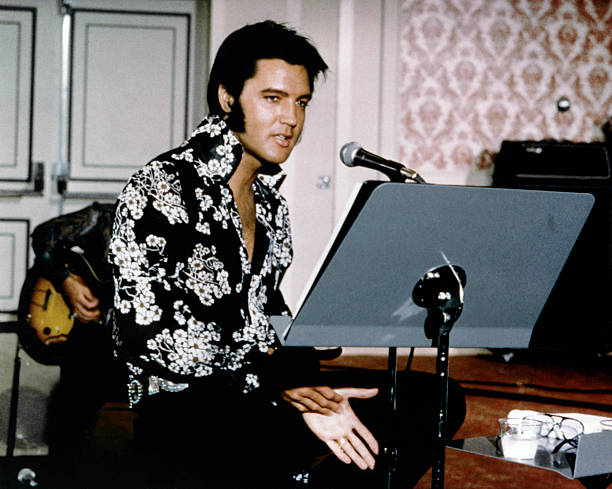 Introduction and Short Summary of the Song
Introduction and Short Summary of the Song
Released in 1960 as the title track of Elvis Presley’s Western film Flaming Star, this song stands out as one of his most dramatic and cinematic soundtrack performances. Written by Sid Wayne and Sherman Edwards, “Flaming Star” captures the somber tone of the movie, which dealt with themes of identity, conflict, and cultural belonging. Unlike the lighthearted musical comedies that dominated Presley’s 1960s film career, Flaming Star was a serious drama, and the title song reflects that shift. With its stark melody, evocative lyrics, and Presley’s commanding vocal delivery, “Flaming Star” is both a narrative device in the film and a strong standalone performance that showcased Elvis’s ability to inhabit a darker, more serious mood.
Origins of the Song
The film Flaming Star, directed by Don Siegel, was released in December 1960. Presley played Pacer Burton, a man of mixed heritage—part Anglo-American, part Kiowa—struggling with his divided identity in the midst of frontier conflict. The movie was a departure from the typical formulaic musicals Presley had been making, offering him one of his most serious acting roles.
---> Scroll down for the VIDEO
The soundtrack required songs that would reflect the film’s somber themes rather than lighten the mood. Sid Wayne and Sherman Edwards composed “Flaming Star” specifically for the movie. Presley recorded the track on October 7, 1960, at Radio Recorders in Hollywood. The performance was designed to complement the film’s opening sequence and set its dramatic tone.
Why Elvis Released “Flaming Star”
By 1960, Presley was transitioning into a new phase of his career. Fresh out of the Army, he was working to balance his recording career with Hollywood film commitments. Unlike G.I. Blues, which leaned into comedy and music-heavy entertainment, Flaming Star was meant to elevate Presley’s credibility as an actor.
---> Scroll down for the VIDEO
The title track was essential to this effort. It was not released as a major single in the United States but was included on the Flaming Star soundtrack EP and later featured on compilation albums. Its release reinforced Presley’s versatility and his ability to adapt his singing style to the demands of a serious Western drama.
The Message Conveyed in the Song
The lyrics of “Flaming Star” are stark and symbolic, speaking of destiny, struggle, and mortality:
“Every man has a flaming star,
A flaming star over his shoulder.”
The “flaming star” serves as a metaphor for fate, danger, and the inevitability of conflict. In the context of the film, it reflects Pacer Burton’s divided loyalties and the tragic inevitability of his story.
Presley’s delivery emphasizes the gravity of the message. His voice is deep, measured, and somber, projecting both strength and vulnerability. The song communicates a sense of inevitability, as though the character’s destiny is written in the stars, and he must face it with courage.
The Recording and Musical Characteristics
“Flaming Star” is musically spare and evocative, fitting the film’s dramatic tone.
-
Vocals: Presley sings with restrained power, his lower register carrying the weight of the lyrics. There is no flamboyance—only solemnity.
-
Instrumentation: The arrangement is simple, with acoustic guitar, percussion, and subtle orchestration providing a stark backdrop. The minimalism enhances the sense of foreboding.
-
Mood: Dark, haunting, and cinematic, the song captures the bleak atmosphere of the film’s frontier setting.
-
Style: Unlike Presley’s upbeat rock-and-roll or romantic ballads, this track leans heavily on folk and Western traditions, with a narrative-driven structure.
The recording is less about musical complexity than about atmosphere and storytelling.
Cultural and Commercial Impact
Commercially, “Flaming Star” did not achieve the chart success of Presley’s major singles. However, the film and its title song were significant in shaping Presley’s career trajectory. The movie was praised by critics as one of his strongest acting performances, and the title track contributed to its serious tone.
In Europe, the song received more attention, with RCA promoting it more heavily than in the U.S. Over time, the track became associated with Presley’s attempts to expand his artistic horizons in both film and music.
Culturally, “Flaming Star” reflected Presley’s willingness to step outside the formulaic musical comedies and take on material that explored deeper themes. It showed that he could handle not only light entertainment but also dramatic storytelling through song.
Legacy of “Flaming Star”
Today, “Flaming Star” is remembered as one of Elvis Presley’s more unusual soundtrack songs, notable not for commercial dominance but for its thematic depth. It remains tied to the film, which is often cited as one of his better acting showcases.
For fans, the song highlights Presley’s ability to deliver somber, dramatic material with conviction. It underscores his versatility: while he was capable of electrifying rock-and-roll and tender love ballads, he could also embody the gravity of a Western epic.
More broadly, “Flaming Star” represents Presley’s ambitions in 1960 to be more than just a pop star. Both the film and the song demonstrated his interest in serious roles and dramatic themes, even if Hollywood would later pull him back into lighter, more commercial fare.
More than sixty years after its release, “Flaming Star” endures as a unique entry in Presley’s catalog, a reminder of the depth he could bring to music when it was tied to weightier storytelling. It may not be one of his most famous tracks, but it stands as an important piece of his artistic evolution.